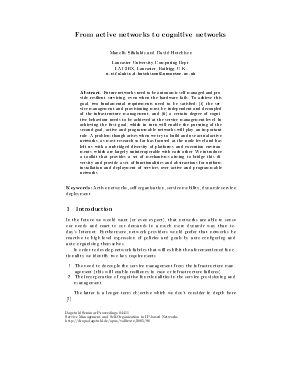From Active Networks to Cognitive Networks
Authors Manolis Sifalakis, David Hutchison
-
Part of:
Volume:
Dagstuhl Seminar Proceedings, Volume 4411
Part of: Series: Dagstuhl Seminar Proceedings (DagSemProc) - License:
 Creative Commons Attribution 4.0 International license
Creative Commons Attribution 4.0 International license
- Publication Date: 2005-03-24
File

PDF
DagSemProc.04411.12.pdf
- Filesize: 129 kB
- 4 pages
Document Identifiers
Subject Classification
Keywords
- Active networks
- self organisation
- service mobility
- dynamic service deployment
Metrics
- Access Statistics
-
Total Accesses (updated on a weekly basis)
0Document
0Metadata
Abstract
Future networks need to be autonomic self-managed and provide resilient servicing, even when the hardware fails. To achieve this goal, two fundamental requirements need to be satisfied: (i) the service management and provisioning must be independent and decoupled of the infrastructure management, and (ii) a certain degree of cognitive behaviour needs to be achieved at the service management level. In achieving the first goal, which in turn will enable the pursuing of the second goal, active and programmable networks will play an important role. A problem though arises when we try to build and use actual active networks, as most research so far has focused at the node level and has left us with a unbridged diversity of platforms and execution environments, which are largely uninteroperable with each other. We introduce a toolkit that provides a set of mechanisms aiming to bridge this diversity and provide a set of functionalities and abstractions for uniform installation and deployment of services over active and programmable networks.
Cite As Get BibTex
Manolis Sifalakis and David Hutchison. From Active Networks to Cognitive Networks. In Service Management and Self-Organization in IP-based Networks. Dagstuhl Seminar Proceedings, Volume 4411, pp. 1-4, Schloss Dagstuhl – Leibniz-Zentrum für Informatik (2005)
https://doi.org/10.4230/DagSemProc.04411.12
BibTex
@InProceedings{sifalakis_et_al:DagSemProc.04411.12,
author = {Sifalakis, Manolis and Hutchison, David},
title = {{From Active Networks to Cognitive Networks}},
booktitle = {Service Management and Self-Organization in IP-based Networks},
pages = {1--4},
series = {Dagstuhl Seminar Proceedings (DagSemProc)},
ISSN = {1862-4405},
year = {2005},
volume = {4411},
editor = {Matthias Bossardt and Georg Carle and D. Hutchison and Hermann de Meer and Bernhard Plattner},
publisher = {Schloss Dagstuhl -- Leibniz-Zentrum f{\"u}r Informatik},
address = {Dagstuhl, Germany},
URL = {https://drops.dagstuhl.de/entities/document/10.4230/DagSemProc.04411.12},
URN = {urn:nbn:de:0030-drops-967},
doi = {10.4230/DagSemProc.04411.12},
annote = {Keywords: Active networks , self organisation , service mobility , dynamic service deployment}
}
